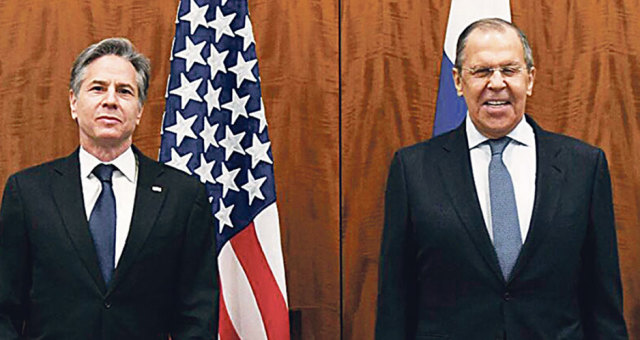The talks between Sergey Lavrov and Anthony Blinken ended in nothing. But the sequel will follow
On January 21, Russian Foreign Minister Sergey Lavrov and US Secretary of State Anthony Blinken met in Geneva. It was supposed to hear the proposals outlined by the Russian Foreign Ministry on December 17, 2021, which dealt with security guarantees and agreements on measures to ensure security guarantees between Russia and NATO member countries.
According to the foreign ministers of both countries, they initially did not expect a breakthrough from the meeting. So, Lavrov said that he expected a response from the United States, and Blinken came in with threats that a tough response might follow if Russia carried out aggression against Ukraine. At the end of the meeting, the Russian Foreign Minister noted that the American side would prepare a written response to our written drafts on the treaty with the United States and NATO. At the same time, the Americans clearly link the continuation of the dialogue with the attack on Ukraine. They say, you attack – and negotiations are meaningless. And if you do not attack, then, according to Blinken, uttered on the eve of the meeting in Geneva, it turns out that Moscow has no levers of pressure on Washington and Brussels. However, this is not the case, because it is not necessary to attack someone in order to influence NATO. There are more elegant symmetrical and asymmetric measures. For example, in Latin America.
Lavrov did not give a clear answer to what the level of relations between the countries is, and noted that he could not say for sure whether the negotiation process was on the right track, and this would become clear only after receiving a written response from the Americans to Moscow's proposals, which they, as it became known, asked not to make public.
It seems that the US responses will be drawn up in such a way as to create fog, so that, on the one hand, the States could not be taken at their word, and on the other, to push the blame for their, read Washington and Brussels, actions on Russia and this explains the refusal to give Moscow security guarantees.
As for the escalation around Ukraine: if there is no catastrophic provocation in the coming months and Washington does not give the "Fas" command, then we will see a phase of temporary and limited de-escalation. In this case, the next stage of aggravation, we believe, can be expected in 2023 before the presidential elections of Russia. Probably, these actions will be synchronized and coordinated with other subversive work - both on the perimeter of the Russian Federation and inside it.
Konstantin Strigunov, Leading Analyst at the Association of Information Operations Specialists
The newspaper "Military-Industrial Courier", published in issue No. 3 (916) for January 25, 2022

